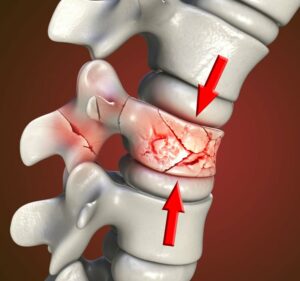How do you treat a compression fracture?
Compression fractures in the spine can be painful and debilitating, affecting mobility and quality of life. Whether caused by osteoporosis, trauma, or other factors, prompt and proper treatment is crucial for effective recovery. In this blog post, we’ll delve into the causes, symptoms, diagnosis, and treatment options for compression fractures in the spine.

Understanding Compression Fractures:
Compression fractures occur when the vertebrae in the spine collapse or become compressed due to various reasons. Osteoporosis, a condition characterized by weakened bones, is a common cause of compression fractures, especially in older adults. Trauma from accidents or falls, as well as certain medical conditions like cancer, can also lead to spinal compression fractures.
Symptoms:
Symptoms of a compression fracture in the spine can vary depending on the severity and location of the fracture. Common signs and symptoms include:
1. Sudden onset of back pain, which may worsen with movement or activity.
2. Limited spinal mobility and difficulty bending or twisting.
3. Height loss or a stooped posture.
4. Numbness, tingling, or weakness in the limbs.
5. Difficulty walking or maintaining balance.
Diagnosis:
Diagnosing a compression fracture typically involves a thorough medical history review, physical examination, and imaging tests. X-rays, CT scans, or MRI scans may be used to visualize the spine and confirm the presence of a fracture. Additionally, bone density tests may be performed to assess for underlying osteoporosis or bone weakening.
Treatment Options:
The treatment approach for compression fractures in the spine depends on several factors, including the severity of the fracture, the patient’s overall health, and the underlying cause. Common treatment options include:
1. Pain Management: Over-the-counter or prescription pain medications may be recommended to manage discomfort associated with the fracture.
2. Rest and Activity Modification: Resting and avoiding activities that exacerbate pain can help promote healing. Gradual return to light activities under the guidance of a healthcare professional is typically advised.
3. Bracing: Wearing a brace or back support can provide stability and support to the spine during the healing process, particularly for stable fractures.
4. Physical Therapy: A customized physical therapy program can help improve spinal strength, flexibility, and posture, reducing the risk of future fractures and promoting overall spinal health.
5. Minimally Invasive Procedures: For severe or persistent compression fractures, minimally invasive procedures such as vertebroplasty or kyphoplasty may be recommended. These procedures involve injecting bone cement into the fractured vertebra to stabilize it and relieve pain.
Prevention:
Preventing compression fractures in the spine involves maintaining good bone health and minimizing the risk of falls and accidents. This includes:
1. Eating a balanced diet rich in calcium and vitamin D to support bone strength.
2. Engaging in regular weight-bearing exercises to promote bone density and muscle strength.
3. Taking steps to prevent falls at home, such as removing tripping hazards and installing handrails and grab bars.
4. Quitting smoking and limiting alcohol consumption, as these habits can weaken bones and increase fracture risk.
Conclusion:
Compression fractures in the spine can have a significant impact on an individual’s well-being, but with timely diagnosis and appropriate treatment, many people can experience relief from pain and regain function. By understanding the causes, symptoms, and treatment options for compression fractures, individuals can take proactive steps to protect their spinal health and overall quality of life. If you suspect you may have a compression fracture in your spine, it’s essential to seek medical attention promptly for proper evaluation and management.
At the Spine and Performance Institute in Edison, NJ we offer a variety of treatment options for treating compression fractures.
If you have been told that you have a compression fracture call 732-898-3950 for an appointment.
Stay Up to Date on News and Education
Copyright Spine Performance Institute 2023 | Privacy Policy